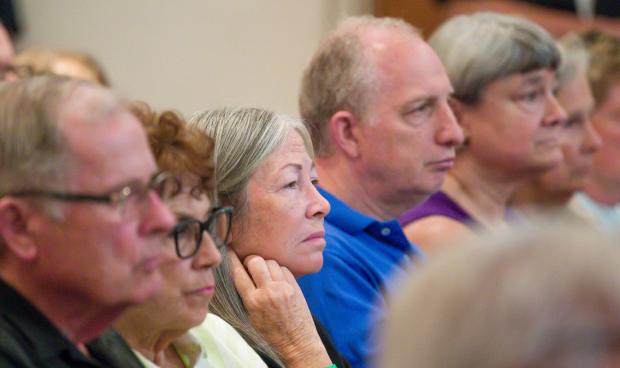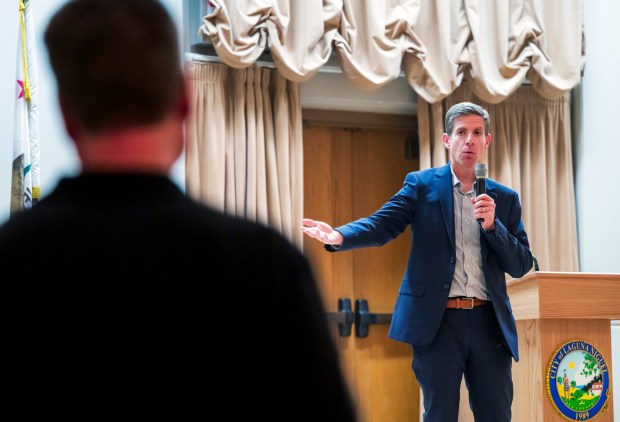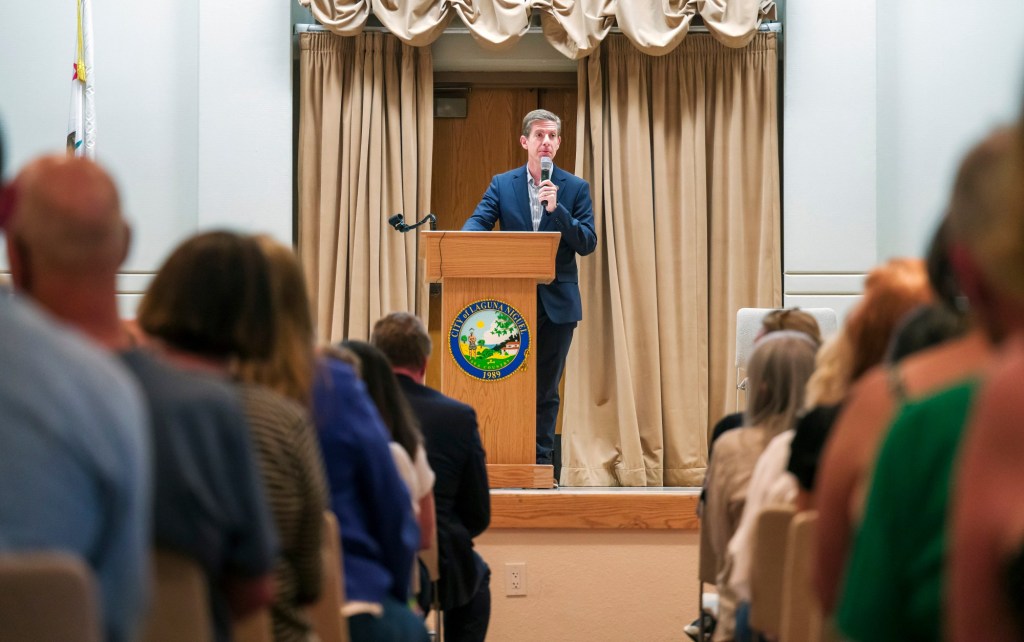When Rep. Mike Levin scheduled his Thursday townhall in a southern Orange County community, it was like any other of his efforts to connect with constituents in a district that stretches north up the San Diego County coast.
But things are moving so fast in state and national politics that Laguna Niguel residents might not even be his constituents much beyond next year, should California voters approve Democrats’ plan to redraw congressional districts.
Communities throughout California could have their representation in Washington change depending on the outcome of a November special election state lawmakers voted Thursday to hold. Under the maps they just approved, Laguna Niguel would be folded into the 47th Congressional District, a seat now held by Rep. Dave Min, a Democrat.
At a Thursday night town hall at the city’s senior center, Levin only briefly touched on the brewing redistricting fight, after being asked about it in the event’s question-and-answer portion.
Levin called Texas’ redistricting “the worst partisan gerrymander in our lifetimes” and noted that California’s will have to go to voters for approval and, if enacted, would be temporary.
“These are not normal times,” Levin told the crowd, echoing the rationale that Newsom and other Democrats have given for their push to temporarily override the state’s independent redistricting commission and gerrymander districts to secure more for their party.
 Laguna Niguel residents and other constituents attend Rep. Mike Levin’s townhall meeting with constituents at the Sea Country Senior and Community Center in Laguna Niguel on Thursday, Aug. 21, 2025, to discuss the impacts of the Republican budget law on health care and other programs. (Photo by Leonard Ortiz, Orange County Register/SCNG)
Laguna Niguel residents and other constituents attend Rep. Mike Levin’s townhall meeting with constituents at the Sea Country Senior and Community Center in Laguna Niguel on Thursday, Aug. 21, 2025, to discuss the impacts of the Republican budget law on health care and other programs. (Photo by Leonard Ortiz, Orange County Register/SCNG)
Now in his fourth term, Levin’s district currently stretches from Del Mar north into Orange County communities like Laguna Niguel, San Juan Capistrano and Dana Point. A proposed redraw would see it lose some of those communities but also reach farther south, all the way to UC San Diego.
In the past, Levin has joined Democratic congressional efforts to create an independent nonpartisan redistricting process that would replace the longtime practice in most other states of districts being drawn by partisan state Legislatures. That proposed nationwide reform failed in the Senate in 2019 and again in 2021.
Should his district shift next year, it wouldn’t be the first time.
“My feeling on that is you got to represent the constituents you have,” Levin said in an interview after the event. “All that hypothetical stuff I can’t worry about until and unless it happens — and if it does, we’ll deal with it.”
Questions posed to Levin by voters Thursday night went well beyond redistricting.
What does he think about the growing presence of federal law enforcement and U.S. troops in Washington, D.C., and Los Angeles? Levin called it borderline illegal and said troops don’t have the training to serve as civilian law enforcement.
What’s the future of Social Security? Levin said the wealthy need to pay a proportional share of their income into the safety-net program.
And what will Democrats do if they take back Congress next year?
On that, Levin wants to restrict the president’s ability to enact tariffs. And if Democrats gain control of the House of Representatives, that means “real, actual, transparent, accountable oversight over the administration,” he said.
“We will ask the tough questions,” he said. “We will subpoena documents and witnesses as necessary.”
 Rep. Mike Levin (CA-49), right, answers a question from Matt Bruce, left, during a town hall meeting with Levin’s constituents at the Sea Country Senior and Community Center in Laguna Niguel on Thursday, Aug. 21, 2025 to discuss the impacts of the Republican budget law on health care and other programs. (Photo by Leonard Ortiz, Orange County Register/SCNG)
Rep. Mike Levin (CA-49), right, answers a question from Matt Bruce, left, during a town hall meeting with Levin’s constituents at the Sea Country Senior and Community Center in Laguna Niguel on Thursday, Aug. 21, 2025 to discuss the impacts of the Republican budget law on health care and other programs. (Photo by Leonard Ortiz, Orange County Register/SCNG)
The tenor of Thursday’s was more muted than other recent townhalls held by Levin and by San Diego’s Rep. Sara Jacobs. At those, Democrats restless about their party’s direction grumbled at Levin’s answers and urged more action from their leaders; one event was disrupted by protests over Israel’s killing of Palestinians in Gaza.
In Laguna Niguel, many voters directed their discontent and worry more at the Trump administration than at Democrats. Others expressed dissatisfaction with the broader U.S. political system, and how difficult it is to change.
“I think about how our democracy is backsliding,” said Roland Serna, a recent San Diego State University political science graduate who said he has previously volunteered for Levin’s campaign.
“We’re on the verge of becoming what is called competitive authoritarianism, where there are still elections but there’s a dominant party that is nearly impossible to get out of power,” Serna said.
For Levin, there’s still plenty to be hopeful about in American democracy and the value of elections.
“This is really tough stuff,” Levin said. “We can’t fix this overnight. But I do think post-2029 — if we are successful in the next couple of election cycles, if it’s a fair fight in ’26 — I think we’re going to be very successful.”
Originally Published: August 22, 2025 at 9:38 AM PDT
